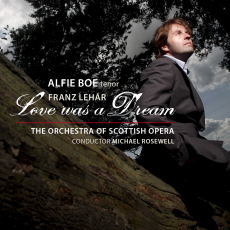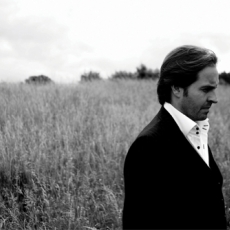Alfie Boe - Love Was a Dream - classicalsource.com
The rise to fame for British tenor Alfie Boe has been fairly rapid. One of nine children of parents of Irish and Norwegian descent, he was discovered singing in a car factory in Blackpool where a customer suggested he apply to D'Oyly Carte Opera. He passed the audition and toured the UK with the company, after which he decided to return to education. Moving to London he gained a place at the Royal College of Music and then studied at the National Opera Studio and subsequently took part in the Royal Opera House Vilar Young Artists' Programme. His really big break came when director Baz Luhrmann chose him to sing Rodolfo in "La bohème" on Broadway and a US tour, a performance for which Boe won a Tony Award. It is a role he has also sung at Glyndebourne and for English National Opera. Boe went on to work for Welsh National Opera, Opera National du Rhin in Strasbourg and La Monnaie in Brussels, while back at the London Coliseum he essayed the roles of Caliph in "Kismet" and Count Rosillon in "The Merry Widow".
This role of Count Rosillon has proved to be quite an important one in Boe's life. When he was a child his father used to play records of Richard Tauber, often singing pieces by Lehár. At the time the young Alfie had no intentions of being an opera singer, but the music stayed with him and this album is a selection of excepts from Lehár's most famous operettas including "The Merry Widow", a work that is allegedly playing somewhere in the world every day of every year. The CD also includes items from Lehár's less well-known or less performed works such as "Paganini", "Frederica", "The Land of Smiles", "Frasquita" and the composer's last work "Giuditta".
Lehár wrote over forty works of music-theatre although not all were completed. Apart from "The Merry Widow", "The Count of Luxembourg", "The Tsarevich" and "The Land of Smiles" were Lehár's only other successes and anyway all these were even eclipsed by the enormous popularity of "The Merry Widow". When I reviewed English National Opera's "Merry Widow" (Classical Source, 26 April 2008) I said of the young tenor's performance: "As his wife Valencienne Fiona Murphy has more exuberant merriment than the widow herself. She is well supported by Alfie Boe as Camille de Rosillon who, apart from becoming a little Tauberish at times, is turning out to be a definite asset to ENO." Of course, given his childhood background and the fact that here he is singing Lehár, perhaps it is no wonder that he sounds like Richard Tauber albeit without the unnecessarily strangulated enunciation that Tauber seemed to manage with exquisite ease.
The music of Lehár often requires a singer to begin softly and work his or her way up in a crescendo passage before dropping down again to finish. The music of Lehár is the most glorious sound that charms, moves and seduces an audience into submission without quite teetering over into sentimental kitsch. This is well demonstrated here in ‘You Are My Heart's Delight' from "The Land of Smiles" or ‘Vilia' from "The Merry Widow" (normally sung by the soprano character Hanna Glawari), two perfect examples of Lehár's musical style. Here Boe sings in a much stylised ‘operatic' way, with well-defined enunciation but seems to have acquired a foreign-sounding accent in his performance. Maybe this is because he is singing the favourite Hungarian music of the legendary Tauber.
This is an album of real lollipops that will appeal to anyone who has even the smallest affection for operetta. Many of the pieces are love songs serenading the heroine in some exotic location. "Frasquita" is set in Barcelona and is famous for its ‘Farewell, My Love, Farewell' with which Tauber caused such a sensation when he played the hero Armand in the first Viennese production. Here Boe recreates the Tauber effect of singing very softly to obtain the right mood of wistful departure, proving that less can often be better than more. With titles like ‘Girls Were Made to Love and Kiss' and ‘Beautiful Italy' ("Paganini"), ‘Patiently Smiling' and ‘Beneath the Window' ("The Land of Smiles"), ‘Love Was a Dream' and ‘Friends, This is the Life for Me!' ("Giuditta") and of course ‘Love Unspoken' ("The Merry Widow" waltz) the schmaltz rating is very high indeed but Lehár knew where to draw the line and Boe knows how to achieve the right effect without laying it on with a trowel.
Michael Rosewell puts the Orchestra of Scottish Opera through its paces with a deal of subtlety that doesn't drown out the soloist, producing a lush sound that is never at all syrupy. The recording is clean and well-balanced and should make a Christmas treat for those with a sentimental soul.

